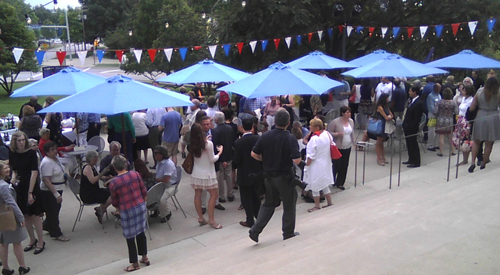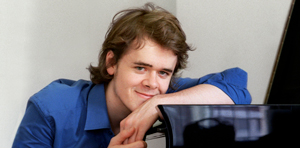by Daniel Hathaway
The Cleveland Orchestra’s new concert series, Summers@Severance, offers a one-hour-or-so performance by the orchestra on three Friday evenings at 7:00 pm, bracketed by a party with drinks and small plates served on the Front Terrace. The concept seems to have caught on quickly, and judging from the number of audience members snapping cell phone pictures of the Severance Hall interior, brought many first-time listeners to hear the Orchestra on opening night, August 1.
Encouraged to dress casually (even the usually formally got-up ushers were decked out in S@S T-shirts), the audience mingled with staff and orchestra members before the concert on the festively-decorated landing outside the main entrance to the hall. You could understand if the downbeat came a few minutes past the stated hour. It was surely a challenge to interrupt the festivities and shoo that crowd into the auditorium.
Once seated, the audience heard a program of Ravel and Rachmaninoff led by guest conductor Johannes Debus, with British pianist Benjamin Grosvenor as soloist in Ravel’s Concerto in G.
Ravel’s Pavane pour une infant défunte provided a gentle and elegant prelude to the concerto. Hornist Michael Mayhew had first dibs on its lovely melody, blending smoothly into the string sound. Then other wind soloists passed it around, adding their own colors to Ravel’s masterful orchestration of a little 1899 piano piece dedicated to the Singer Sewing Machine heiress, the Princesse de Polignac.
Had the piano already been in place, the concerto might have followed close on the Pavane for a striking contrast in styles. Even with the interruption of a stage switch, the beginning of Ravel’s first piano concerto tells you that something completely different is afoot. The cracking of a whip launches a razzy-jazzy, caffeinated movement with non-stop piano fireworks that only relaxes briefly to sound remarkably like Gershwin.
The gorgeous second movement begins with a wistful, wandering and seemingly endless piano melody, later taken over by the English horn. Perpetual motion returns in the finale.
Under the best of conditions (meaning plenty of rehearsal time), Ravel in G is a tricky puzzle to fit together, and this performance probably needed one more run-through. Debus, an efficient presence on the podium, was kept busy trying to keep all the details lined up.
Benjamin Grosvenor played accurately and incisively, but seemed rather distant. Michael Sachs’s trumpet solos added punch and flair to the fast movements, while Robert Walters’s melting English horn solo restored the necessary sense of line to the slow movement theme. The percussion section was flawless.
After bidding the soloist’s Steinway goodbye (a second one remained behind the violins), Debus and the Orchestra embarked on a thrilling journey through Sergei Rachmaninoff’s last composition, the Symphonic Dances of 1940. Here, Debus had more of an opportunity to shape a performance beyond merely keeping order, and the score’s lush coloration and Russian personality came through clearly. Jeffrey Zehngut provided a special hue in the first movement on the alto saxophone — from his usual desk at the back of the second violin section — and numerous soloists merited solo bows at the end during a resounding standing ovation.
When members of the audience moved back to the Front Terrace after the concert, it was clear that something was about to happen: house managers and ushers were having secretive conversations over their headsets. No, they weren’t working the crowd for the Secret Service, just coordinating a surprise post-concert entertainment, a performance by Verb Ballets.
Verb treated the mesmerized partygoers to an athletic performance of Dark Matter, choreographed by Tommie-Waheed Evans to a pulsating score by Greg Smith that managed to combine electronica with J.S. Bach’s organ Prelude in a minor and Toccata and Fugue in d minor. Though it goes on a bit long for the audience (maybe also for the dancers!), Verb were impressive in their physicality, stamina and concentration as they went through individual body motions that would send most of us straight to a chiropractor, charged on and off “stage,” combined into different groupings and eventually formed a communal circle. Dark Matter is scheduled to be repeated during the Gay Games this month.
Fridays @ Severance is a great format for a weekend evening in August. Concerts continue on August 15 with an all-Beethoven program led by Jahja Ling featuring pianist Orion Weiss and the Blossom Festival Chorus in the Choral Fantasy and the orchestra alone in the Overture to The Creatures of Prometheus and Symphony No. 4. The third and final program on August 29 will be led by music director Franz Welser-Möst, with music by Jorg Widmann (Lied and Flûte en Suite with principal flutist Joshua Smith) and Johannes Brahms (Symphony No. 1). Each program, slightly expanded, will be performed the following Saturday evening at Blossom.
Verb Ballet photos by Roger Mastroianni.
Crowd photo by the author.
Published on ClevelandClassical.com August 2, 2014.
Click here for a printable copy of this article.








